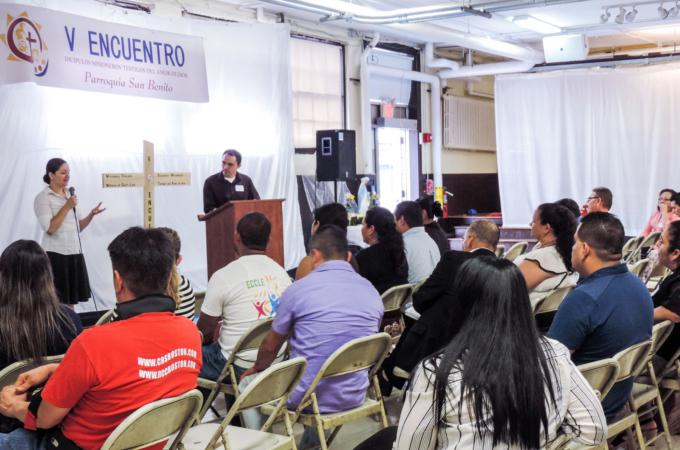Boston parishioners meet in preparation for National Encuentro
BRAINTREE -- While the V National Encuentro is still a little over a year away, parishes across the Archdiocese of Boston are busily holding their own Encuentros.
A U.S. Conference of Catholic Bishops initiative, the Encuentro (Spanish for "Encounter") is a two-year process designed to encourage evangelization, leadership development, and consultation in Hispanic communities across the U.S. Parish, diocesan, and regional Encuentros are held before culminating in a National Encuentro.
The first National Encuentro was held in 1972, and served as a way to take into account the needs and contributions of Hispanic Catholics throughout the U.S. Since that time, the event has taken place sporadically, with the last one, the IV Encuentro, taking place in 2000.
The V National Encuentro, to be held in September 2018, will focus again on addressing the pastoral needs of the Hispanic Catholic communities, one of the largest Catholic communities in the country and in Boston, as well as encourage communities to evangelize. That focus can be found in Encuentros on the parish, diocesan, regional, and national level.
The Encuentro is needed, said evangelization consultant for Ethnic Communities in the archdiocese Sister Elsa Narvaez Rodriguez, HMSP, because "we have seen that the community is growing, and we're not serving it as well as we should."
"We need to find what exactly is happening with the community in order to serve it better," she said in an Aug. 18 interview alongside Natalia Pellicano, Director of Ethnic Community Faith Formation and Missionary Discipleship.
Sister Elsa is part of a diocesan team that has been working directly with parishes with Hispanic communities to help them facilitate their own Encuentros. The team helps train leaders, who then lead small groups within the parish on five weeks of missionary activity. Every week the groups hold a meeting, and, after they "meditate the word of God and the reality of Catholic Hispanics in the U.S.," group members are sent out to evangelize in the communities.
After those five weeks, the individual groups are invited to come together as a parish community.
"The idea is that we can gather the community, no matter what group or charism you belong to or what age you are... and share a moment of joy and also get to know the reality of the parish," said Sister Elsa.
Pellicano added that "This was specifically made that pastors would gather members of each group and even include youth and young adults, and include people who don't come to church, so that they can actually see and understand how they can better serve the people that are in their surroundings and the people that are coming to their parish."
"It's been great because a lot of these groups have come together and have worked together in the parishes for this as one effort and seen that they're all bringing the word of Christ in their own charisma and unique way," she said.
The community writes a report on their needs, aspirations, and potential changes it may want made, and sends the report to the pastor. Reports and feedback are being compiled for the diocesan Encuentro, where suggestions will be made to support the Hispanic populations in the entirety of the archdiocese. Feedback there will be brought up to the regional Encuentro, and ultimately the national Encuentro, where the USCCB will offer suggestions and policies that will impact Hispanic communities across the U.S.
Pellicano predicts that the diocesan Encuentro, to be held in early 2018, will "allow us to know our diocese a lot better, so that we can offer better programs for faith formation, we can offer better evangelization methods," and we can bring Spanish-speaking priests to parishes with large Hispanic communities.
There will be a processing time for the Encuentros afterwards, but already, said Pellicano, "I feel that this is the closet the diocese has worked with the Hispanic community in many years."



















